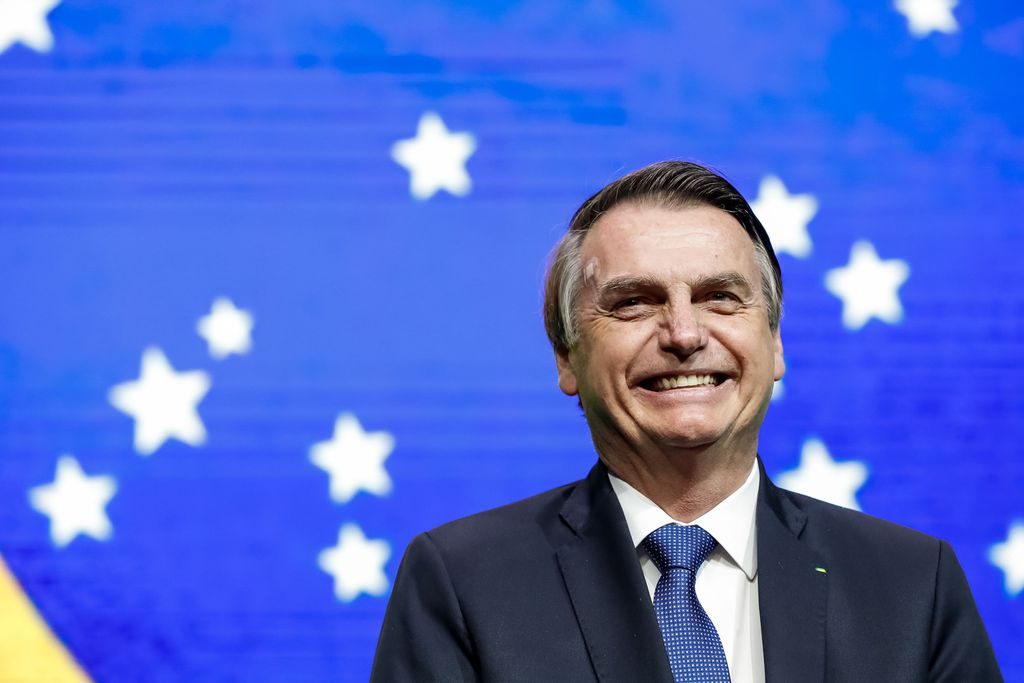RIO DE JANEIRO, BRAZIL – The municipal elections are barely over and the presidential race is already on the political world’s radar. A survey conducted by the Paraná Institute shows that if the election were held today, President Jair Bolsonaro would lead in the three first-round scenarios tested and in the five second-round simulations made.
Considering all scenarios presented by the institute, 12 names are tested at least once for the first round, with four of them appearing in all three cases: Jair Bolsonaro (no party), Ciro Gomes (PDT – Democratic Labor Party), João Doria (PSDB – Brazilian Social Democratic Party) and João Amoêdo (Novo – New Party).
In addition, Fernando Haddad (PT – Workers’ Party), Flávio Dino (PCdoB – Communist Party of Brazil), Guilherme Boulos (PSOL – Socialism and Liberty Party), Luciano Huck (no party), Luiz Henrique Mandetta (DEM – Democrats), Lula (PT), Marina Silva (Rede – Sustainability Network) and Sérgio Moro (no party) are tested.

Given that the presidential race is still two years away, there is no clear view of the candidacies and how the parties will proceed until then. The election is also far from the voters’ considerations. But the survey works as a test for often speculated names.
The survey was conducted by telephone interviews between November 28th and December 1st and included a sample of 2,036 voters, broken down by gender, age group, schooling, economic level, and geographical position. The estimated error margin is two percentage points plus or minus.
In two earlier surveys, the Paraná Research Institute tested the three scenarios including the name of Wilson Witzel (PSC – Social Christian Party), who did not exceed 1% at any point in time and is now the removed governor of Rio de Janeiro. This means the series are not perfectly comparable to the current issue.
In all scenarios, Bolsonaro comes out ahead, with a range of voting intentions between 33% and 36%. Depending on the simulation, the second position is held by ex-judge Sérgio Moro (12%), ex-president Lula (18%), or ex-governor Ciro Gomes (8%-12%).
São Paulo governor João Doria stands with 4% or 5% of voting intentions, again numerically behind Guilherme Boulos (5%-6%), entrepreneur and TV host Luciano Huck (8%-10%), and ex-mayor Fernando Haddad (9%-12%).
After the wide exposure he achieved during the campaign for mayor of the city of São Paulo, Boulous, also the leader of the Homeless Workers Movement (MTST) shows potential to split left-wing votes, should he manage to maintain his current level.
On the other hand, Huck, often pointed out as an option to lead a “centrist” coalition to face Bolsonaro, shows high electoral potential and shadows Doria’s claims.
Second round
Bolsonaro also stands ahead of five opponents in the second round simulations: Lula (+14 percentage points), Sérgio Moro (+10 p.p.), Ciro Gomes (+18 p.p.), João Doria (27 p.p.), and Luciano Huck (19 p.p.).
There was no significant variation in any of the scenarios compared to the July survey. The most balanced dispute today is with Sérgio Moro, who led his government’s Ministry of Justice and Public Safety until April.
Presidential rating
The Paraná Institute survey also heard the opinion of voters about the Jair Bolsonaro government. For 37%, the current management is excellent or good, the same rate of those who rank it as poor or terrible. Four months ago, the negative ratings exceeded the positive by 4 percentage points. In May, the difference reached 7 p.p.
Uncertainties
The presidential elections are two years away and a number of steps need to be taken until then. One of them concerns Bolsonaro’s party affiliation.
The President left the PSL (Social Liberal Party) in November 2019 and tried to build his own party – the Aliança pelo Brasil (Alliance for Brazil), which so far has not materialized.
Since the results of the municipal elections, the prospect of the President joining an existing party has gained ground: the PP (Progressives), Republicanos, and PSD (Social Democratic Party) are among those listed. His return to the PSL is also considered a possibility.
There is as yet no definition on the other candidates and how the parties should behave. There is currently a joint effort of MDB (Brazilian Democratic Movement), DEM, and PSDB to field a single candidate – today the most quoted are João Doria, Luciano Huck, and Luiz Henrique Mandetta.
Sérgio Moro’s name is often mentioned because of his high political capital. But his recent contract as director of the American consulting firm Alvarez & Marsal – an office that counts Odebrecht as one of its clients – may distance him from political ambitions.
On the left-wing, there are also a number of open issues. The PT’s poor result in the municipal elections raises questions over how the party will react; since 1989 it has always launched its own candidate rather than joining coalitions. The legal situation of its leader, ex-president Luiz Inácio Lula da Silva, is still unpredictable.
Leftist parties PDT and PSB are rehearsing a rapprochement around the candidacy of ex-governor of Ceará Ciro Gomes. Guilherme Boulos (PSOL) successful campaign to reach the run-off election for São Paulo mayor also places him in an advantageous position during discussions among progressive parties.
Source: InfoMoney

